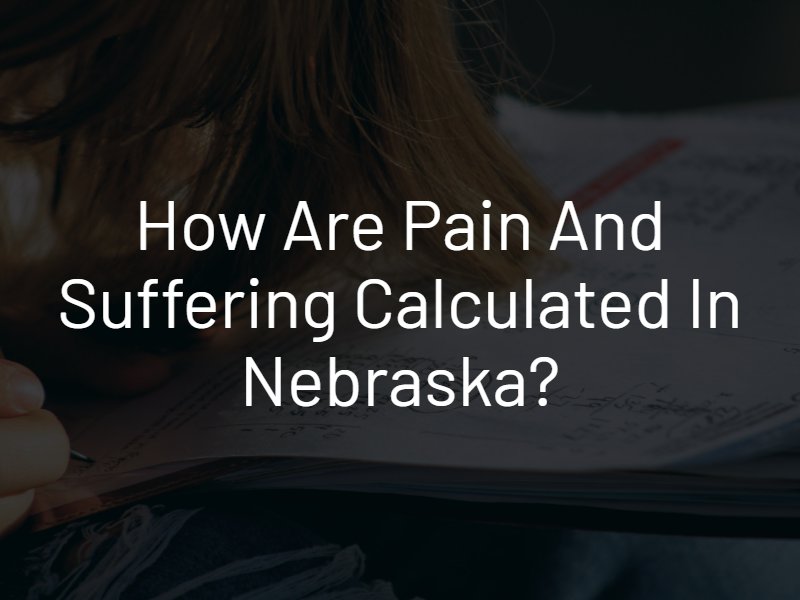
Legally Reviewed By: Robert M. Knowles
Attorney & Partner At Knowles Law Firm
Pain and suffering damages are a crucial part of a personal injury claim, compensating victims for the physical and emotional toll of an accident. While economic damages like medical bills and lost wages are easier to calculate, pain and suffering are more subjective. Nebraska law allows injury victims to pursue compensation for these intangible losses, but determining a fair amount can be challenging. Understanding how pain and suffering damages are calculated can help you know what to expect in your case.
Assigning a dollar amount to pain and suffering is not a simple process. Courts and insurance companies use different methods, such as the multiplier or per diem approach, to determine appropriate compensation. The severity of your injury, its long-term impact, and the emotional distress you experience all factor into the final amount. With decades of experience handling Nebraska personal injury cases, the attorneys at Knowles Law Firm understand how to build strong claims that accurately reflect the true extent of your suffering. If you need assistance with your claim, don’t hesitate to contact us and retain our support.

Pain and Suffering Damages: Economic or Noneconomic Losses?
Pain and suffering damages are a crucial component of personal injury claims, aiming to compensate individuals for the physical, emotional, and mental distress caused by an injury. Unlike economic damages, which cover tangible financial losses such as medical bills or lost wages, pain and suffering damages address the intangible effects of an injury.
These can include physical pain, emotional distress, loss of enjoyment of life, and scarring or disfigurement. By acknowledging these noneconomic impacts, pain and suffering compensation seeks to provide a more holistic form of relief to injury victims.
Pain and Suffering: What is It?
If you get injured and file a personal injury lawsuit in Nebraska, you may be eligible to recover a category of damages referred to as pain and suffering. Pain and suffering is an umbrella phrase that refers to many different types of intangible or general losses connected to an accident. Knowing how pain and suffering is calculated in the Nebraska courts can help you understand the value of your lawsuit.
The byproducts of an accident are not only financial. Some of the worst ways that an accident affects a victim are not economic or tangible. Noneconomic damages are the personal side of a personal injury – the pain, anguish, and distress a victim experiences physically, emotionally, and psychologically from the accident. During a personal injury lawsuit in Nebraska, you may be able to list these losses in your demands and obtain financial compensation.
The broad concept of pain and suffering can refer to many intangible and noneconomic losses, including:
- Physical pain or disability
- Chronic pain
- Scarring or disfigurement
- Emotional distress or anguish
- Shock
- Mental or psychological trauma
- Grief
- Post-traumatic stress disorder
- Anxiety or depression
- Insomnia
- Inconvenience
- Lost enjoyment of daily activities
- Loss of household services
- Loss of consortium
Proving pain and suffering is more difficult than proving tangible losses. There is no hard evidence, such as medical bills, to prove that an accident gave you physical or emotional distress. Instead, you must rely on spoken or written statements from your friends, family members, subject experts, and psychologists. You can also use a mental health diagnosis from a psychiatrist and an injury journal to demonstrate your pain and suffering.
Calculation Methods for Pain and Suffering Damages
If a jury decides to grant a plaintiff an award for pain and suffering, it will assign an amount that is appropriate for the circumstances. A jury can decide on any amount it wants in pain and suffering damages, subject to a maximum on medical malpractice claims. Nebraska law does not mandate a single formula to use for calculating noneconomic damages. However, understanding how to calculate pain and suffering is crucial for fair compensation. Many juries rely on one of two calculation methods: the per diem method or the multiplier method.
The per diem method assesses the number of days the victim will most likely experience pain and suffering and is one of the common methods for calculating pain in personal injury cases. It multiplies it by a monetary amount that matches the intangible losses (usually equivalent to the victim’s daily wage). The multiplier method multiplies the total amount the victim received in economic damages by a number from one to five, with a lower multiplier used for more minor pain and suffering and a higher multiplier for catastrophic injuries.
The per diem method is more common with short-term injuries, while the multiplier method is used more often for permanent injuries. Although the State of Nebraska only has a maximum on noneconomic damages in medical malpractice claims (no more than $2.25 million in economic and noneconomic damages combined), federal law generally holds that a noneconomic damage award must be reasonable compared to the victim’s sum of economic damages.
Factors That Influence Suffering Damages
Several factors can influence the amount of suffering damages awarded in a personal injury case. The severity of the injury is a primary consideration; more severe injuries that result in long-term or permanent effects typically warrant higher compensation. The impact on daily life is another critical factor, as injuries that significantly disrupt daily activities, work, or enjoyment of life can lead to higher awards.
Additionally, the age and lifestyle of the victim play a role; younger individuals or those with active lifestyles may receive higher compensation if their injury drastically alters their future opportunities or quality of life. Finally, the duration of pain and suffering is considered, with longer recovery periods or more permanent effects leading to higher damages.
Evidence for a Successful Claim
To prove pain and suffering damages, it is essential to gather compelling evidence.
Medical records are crucial, providing detailed documentation of the injury, treatment, and recovery process. Witness statements from family, friends, or colleagues can attest to the impact of the injury on daily life. Photographs and videos offer visual evidence of the injury, treatment, and recovery process. Expert testimony from medical professionals or other experts can provide insight into the severity of the injury and its effects. Personal diaries and journals, where the victim records their experiences, can also be powerful evidence in demonstrating the extent of pain and suffering.
Challenges in Proving Pain and Suffering
Proving pain and suffering damages can be challenging due to their subjective nature. One common obstacle is the lack of objective evidence, as pain and suffering are intangible and cannot be measured or quantified like medical bills or lost wages.
Additionally, assigning a monetary value to pain and suffering can be complex and subjective, as it involves evaluating the personal and emotional impact of the injury on the victim’s life. These challenges make it essential to present a well-documented and compelling case to support a pain and suffering claim.
What is the Average Pain and Suffering Compensation?
What a victim receives in pain and suffering damages can vary greatly from case to case. Since this is a subjective award that is based on each claimant’s individual experience, it is impossible to assign an average award amount. The best way to assess your pain and suffering damages is by consulting with a personal injury lawyer in Omaha who can help ensure you receive fair compensation for your personal injury claim. A lawyer can review the facts of your unique case to accurately assess your pain and suffering. Then, the lawyer can help you fight for maximum financial relief.
If you were recently injured in an accident in Nebraska, discuss your right to recover economic and noneconomic damages with an attorney in Omaha. An attorney can accurately evaluate your case and help you maximize your results using proven legal strategies. Discuss your case with the attorneys at Knowles Law Firm today for more information. You can call (402) 431-9000 or complete our contact form to access a free consultation with one of our talented attorneys.

About Our Attorney
Robert M. Knowles
Attorney & Partner at Knowles Law Firm
Robert has tried cases in both state and federal courts and was selected as one of the top 100 litigation lawyers in Nebraska for 2014 by the American Society of Legal Advocates. Less than 1.5 percent of lawyers nationally are selected for this recognition. He is rated AV by Martindale-Hubbell which is the highest rating an attorney can obtain. He was also selected by Martindale-Hubbell as a 2019 Top Rated Lawyer.


 Menu
Menu
